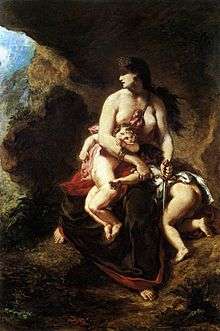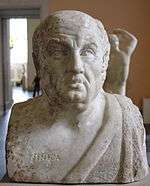Medea (Seneca)
 Medea about to kill her children (Eugène Delacroix) | |
| Author | Lucius Annaeus Seneca |
|---|---|
| Country | Rome |
| Language | Latin |
| Genre | Tragedy |
| Set in | Corinth, Greece |
Publication date | 1st century |
| Text | Medea at Wikisource |
Medea is a fabula crepidata (Roman tragedy with Greek subject) of about 1027 lines of verse written by Seneca. It is generally considered to be the strongest of his earlier plays.[1] It was written around 50 CE. The play is about the vengeance of Medea against her betraying husband Jason and King Creon. The leading role, Medea, dominates the play with over half of the lines spoken by her.[2] Medea contains lots of themes, one of them is that she is the punishment of humanity because of her superiority over other characters.[3] She was sent by the gods to punish Jason for his sins. Another theme is her powerful voice that cannot be silenced, even King Creon could not silence her.[3]
Characters
- Medea: daughter of King Aeëtes (King of Colchis), wife of Jason
- Chorus: Corinthians, hostile to Medea and not Jason
- Nutrix (nurse): nurse of Medea
- Creon: King of Corinth, father of Princess Creusa
- Jason: son of Aeson and husband of Medea who leaves her for the princess
- Nuntius (messenger)
- Two sons of Medea and Jason: mute characters
Background
Medea falls in love with Jason while he is on his quest for the Golden Fleece and uses her supernatural powers to aid him in completing the tasks that King Aeëtes, her father, had set.[4] The three tasks were: yoke the fiery bulls, compete with the giants, and slay the dragon that was guarding the fleece. After Jason is successful, Medea kills her own brother to distract her father and enable their escape.[5] After their return to Iolcus, they were again forced to flee when Medea uses her powers to have Jason's uncle Pelias killed by his own daughters. Jason and Medea next settle in Corinth where they had two sons.
Plot
In order to climb the political ladder, Jason leaves Medea for Creusa who is the daughter of King Creon. Medea opens up the play by cursing Creusa and King Creon (1-44).[6] King Creon gives Medea one day before she is exiled and she does not take Jason's advice on going peacefully(192-557).[6] She uses a regal robe to poison and sends it as a gift for Creusa on her wedding day with Jason. The chorus describe in great detail the rage, scorn, and anger that Medea felt as she plotted her revenge. The chorus prays to the gods that Jason (the leader of the Argonauts) is spared from Medea's vengeance (579-652).[6] Medea's curse contains poisons, snake blood, herbs, and the invocations to all the underworld gods. The cursed robe kills Creusa and Creon by catching on fire when Creusa puts it on. Creon tries to put out his daughter but is unsuccessful and he catches on fire too (817-843).[6] Their death does not satisfy Medea but only awakens her vengeful spirt more. Jason's betrayal blinds Medea so much that her number one priority is hurting Jason. Even if hurting Jason means hurting her children. Medea sacrifices her children from the roof of her house in order to hurt Jason (982-1025).[6] Medea escapes in a dragon chariot while she throws the bodies of the boys down to Jason. Jason closes the play by stating that there are no gods because otherwise such acts would have not been committed (1026-1027).[6]
Euripides vs. Seneca
While Euripides' Medea share similarities, they are also quite different. One should note that Seneca's Medea was written after Euripides'. Also, Seneca starts off his play with Medea herself expressing her hatred of Jason and Creon. Her first line is "O gods! Vengeance! Come to me now, I beg, and help me..."[6] while Euripides introduces Medea later on in scene one complaining to her nurse of the injustices she has faced. The chorus in Euripides' Medea is not objective towards her. The chorus in Seneca's Medea does not ridicule her and has an objective position throughout the play. Seneca's chorus does not show sympathy towards Medea. The final scenes are particularly different because Medea does not blame Jason for the death of her children in Seneca's version.[5] She even kills one of her sons in front of Jason and blames herself for their death.[5] In Euripides' version Medea does the opposite, because she blames Jason and does not carry any guilt or blame with her.
References
- ↑ Heil, Andreas; Damschen, Gregor (2013). Brill's Companion to Seneca: Philosopher and Dramatist. BRILL. p. 594. ISBN 9004217088. "Medea is often considered the masterpiece of Seneca's earlier plays, [...]"
- ↑ A.D.,, Seneca, Lucius Annaeus, approximately 4 B.C.-65. Medea. Boyle, A. J. (Anthony James), (First ed.). Oxford. ISBN 9780199602087. OCLC 862091470.
- 1 2 Boyle, A.J. (1997). Tragic Seneca: An essay in the theatrical tradition. London and New York: Routledge. p. 127.
- ↑ Hine, H.M. (2000). ntroduction. Seneca. Medea, 6-49. With an introduction, text, translation and commentary. Warminster: Aris & Phillips. p. 22.
- 1 2 3 Lavilla de Lera, Jonathan (2016). "A metatheatrical perspective on the Medea of Seneca". ANÁLISIS. 47: 154.
- 1 2 3 4 5 6 7 "SENECA THE YOUNGER, MEDEA - Theoi Classical Texts Library". www.theoi.com. Retrieved 2017-07-27.
